高考英语二轮语法专题复习-专题8 状语和状语从句 导学案-2026届高三英语上学期一轮复习专项
文档属性
| 名称 | 高考英语二轮语法专题复习-专题8 状语和状语从句 导学案-2026届高三英语上学期一轮复习专项 |
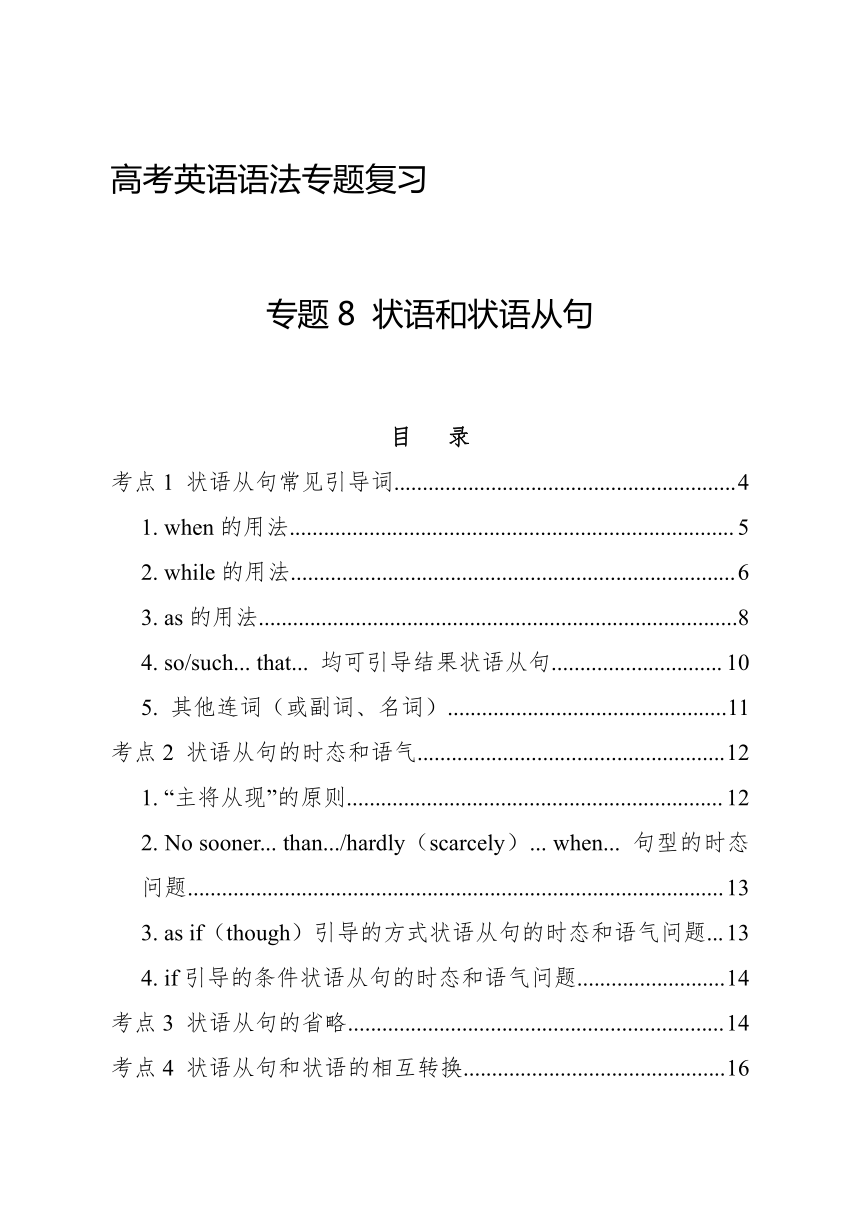
|
|
| 格式 | docx | ||
| 文件大小 | 35.2KB | ||
| 资源类型 | 教案 | ||
| 版本资源 | 人教版(2019) | ||
| 科目 | 英语 | ||
| 更新时间 | 2025-07-18 16:43:23 | ||
图片预览

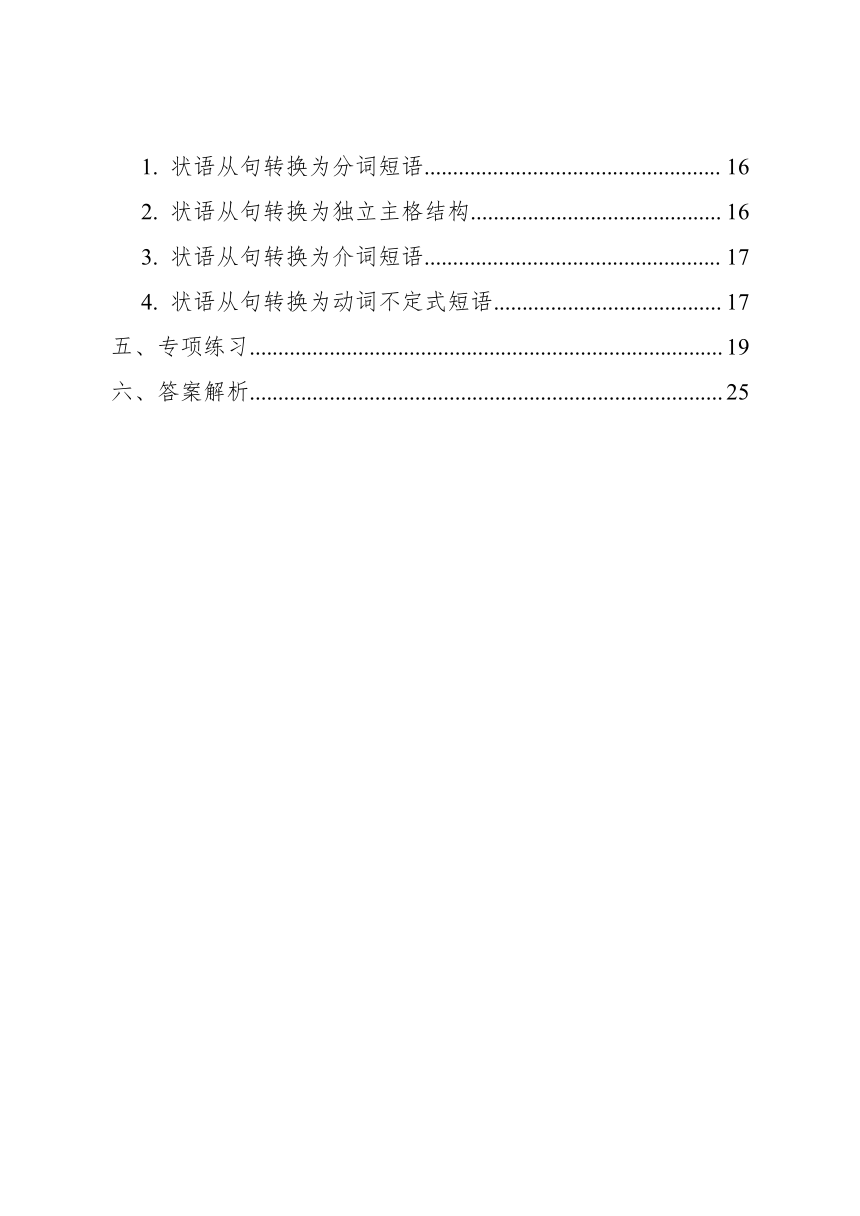
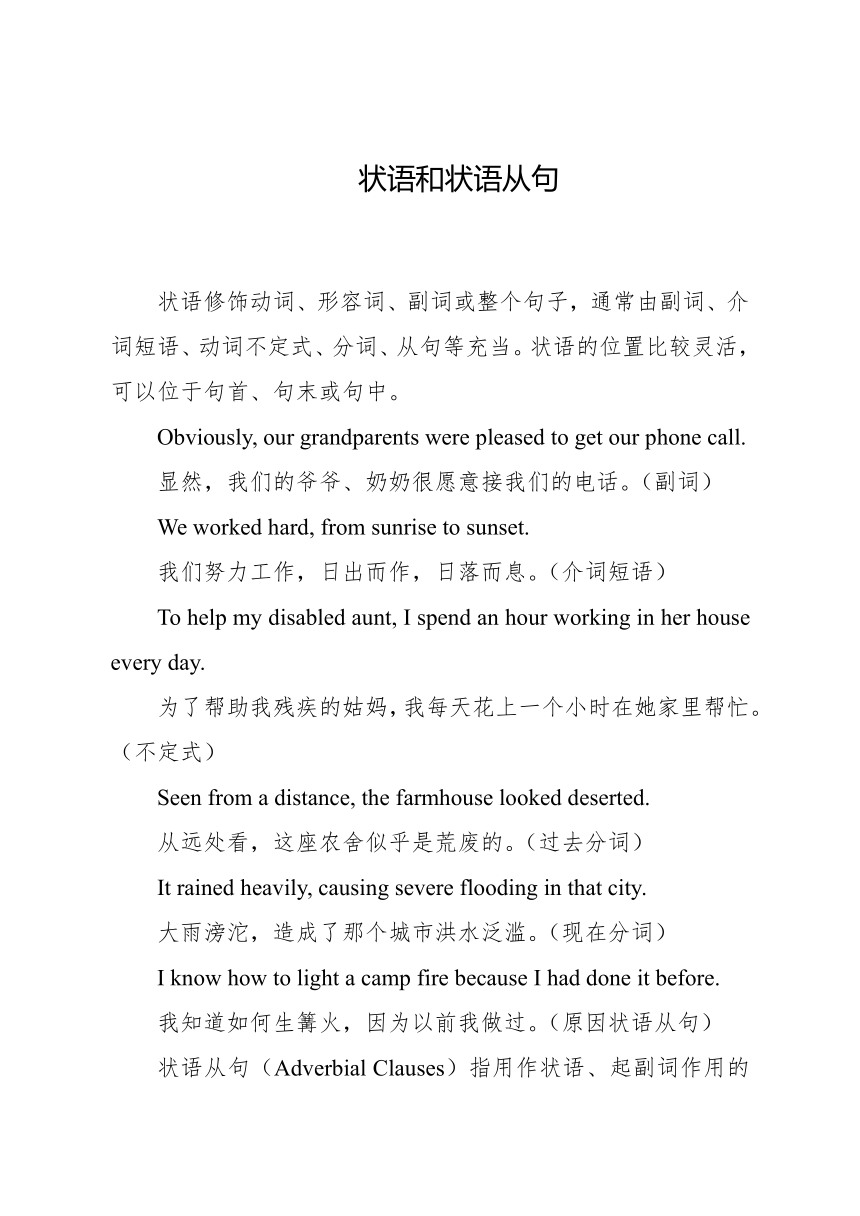
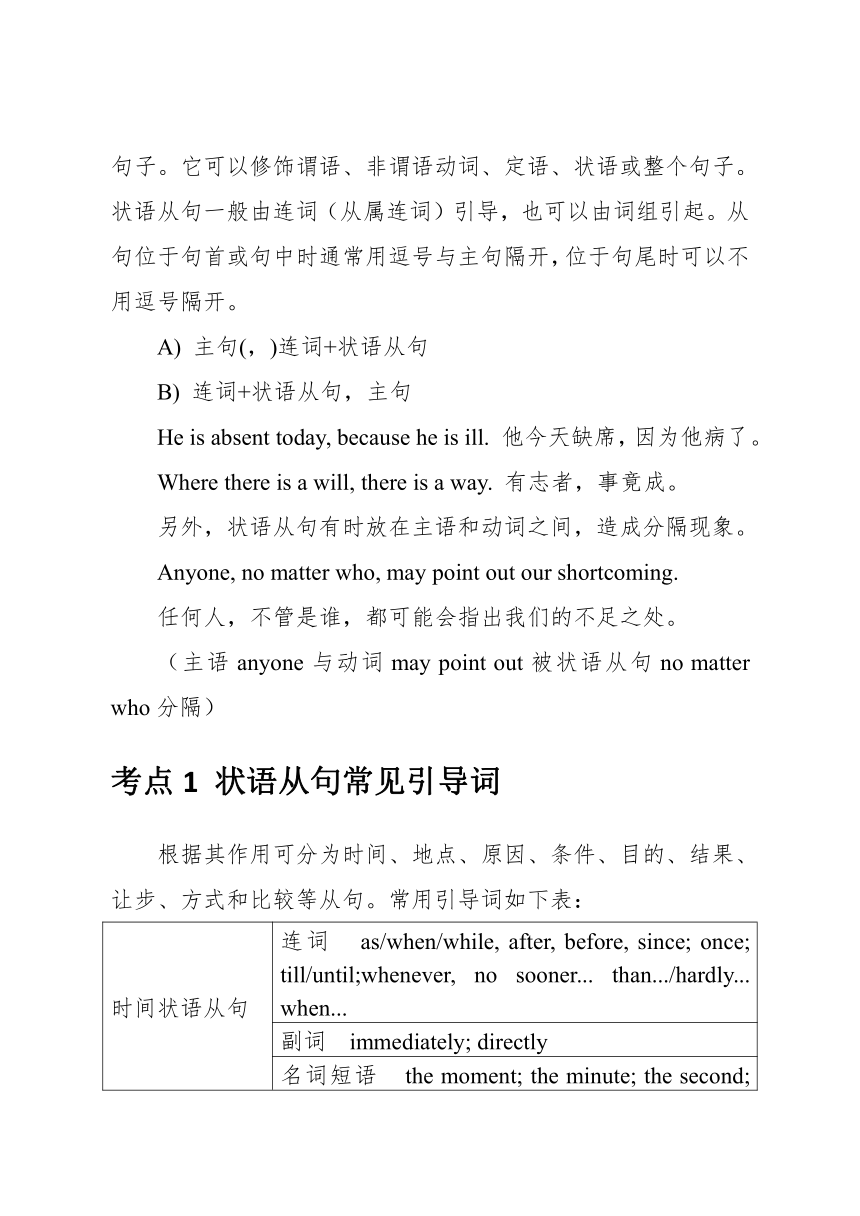
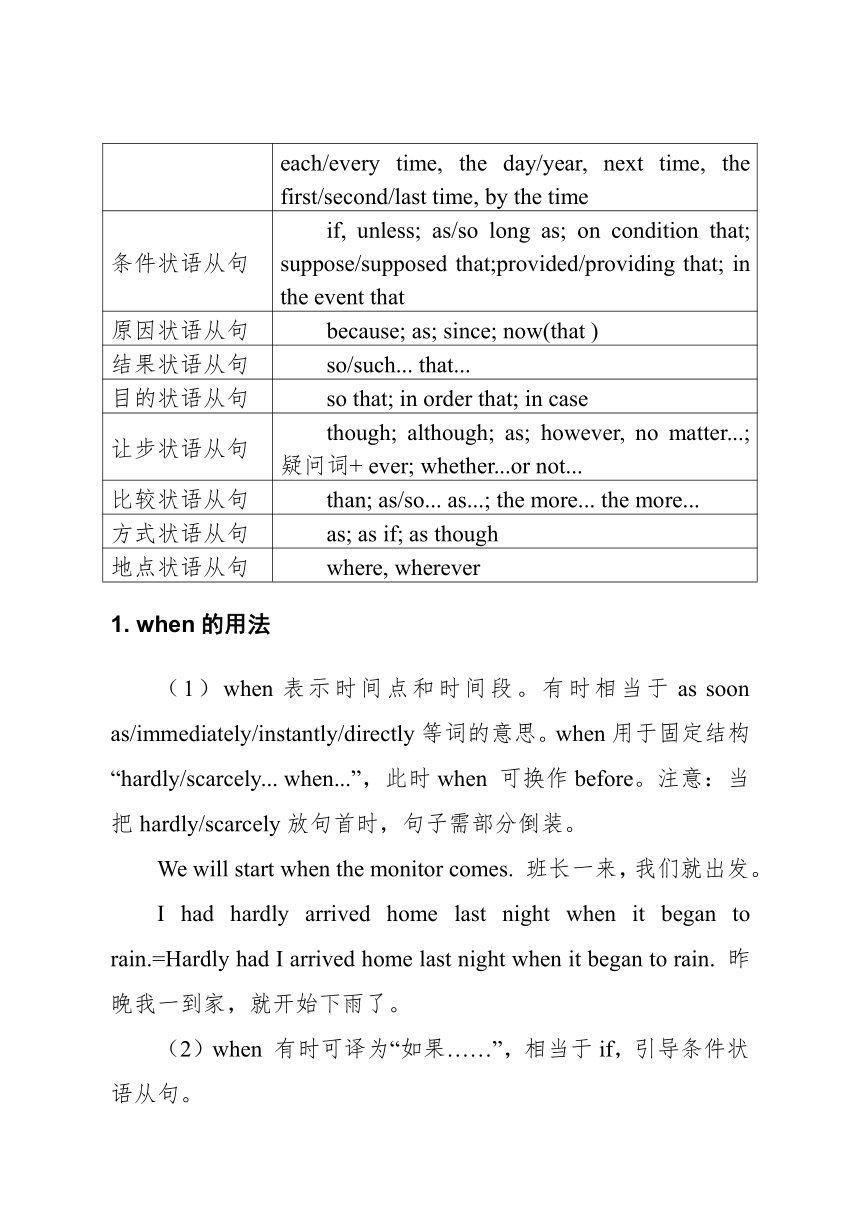
文档简介
高考英语语法专题复习
专题8 状语和状语从句
目 录
考点1 状语从句常见引导词 4
1. when的用法 5
2. while的用法 6
3. as的用法 8
4. so/such... that... 均可引导结果状语从句 10
5. 其他连词(或副词、名词) 11
考点2 状语从句的时态和语气 12
1. “主将从现”的原则 12
2. No sooner... than.../hardly(scarcely)... when... 句型的时态问题 13
3. as if(though)引导的方式状语从句的时态和语气问题 13
4. if引导的条件状语从句的时态和语气问题 14
考点3 状语从句的省略 14
考点4 状语从句和状语的相互转换 16
1. 状语从句转换为分词短语 16
2. 状语从句转换为独立主格结构 16
3. 状语从句转换为介词短语 17
4. 状语从句转换为动词不定式短语 17
五、专项练习 19
六、答案解析 24
状语和状语从句
状语修饰动词、形容词、副词或整个句子,通常由副词、介词短语、动词不定式、分词、从句等充当。状语的位置比较灵活,可以位于句首、句末或句中。
Obviously, our grandparents were pleased to get our phone call.
显然,我们的爷爷、奶奶很愿意接我们的电话。(副词)
We worked hard, from sunrise to sunset.
我们努力工作,日出而作,日落而息。(介词短语)
To help my disabled aunt, I spend an hour working in her house every day.
为了帮助我残疾的姑妈,我每天花上一个小时在她家里帮忙。(不定式)
Seen from a distance, the farmhouse looked deserted.
从远处看,这座农舍似乎是荒废的。(过去分词)
It rained heavily, causing severe flooding in that city.
大雨滂沱,造成了那个城市洪水泛滥。(现在分词)
I know how to light a camp fire because I had done it before.
我知道如何生篝火,因为以前我做过。(原因状语从句)
状语从句(Adverbial Clauses)指用作状语、起副词作用的句子。它可以修饰谓语、非谓语动词、定语、状语或整个句子。状语从句一般由连词(从属连词)引导,也可以由词组引起。从句位于句首或句中时通常用逗号与主句隔开,位于句尾时可以不用逗号隔开。
主句(,)连词+状语从句
连词+状语从句,主句
He is absent today, because he is ill. 他今天缺席,因为他病了。
Where there is a will, there is a way. 有志者,事竟成。
另外,状语从句有时放在主语和动词之间,造成分隔现象。
Anyone, no matter who, may point out our shortcoming.
任何人,不管是谁,都可能会指出我们的不足之处。
(主语anyone与动词may point out被状语从句no matter who分隔)
考点1 状语从句常见引导词
根据其作用可分为时间、地点、原因、条件、目的、结果、让步、方式和比较等从句。常用引导词如下表:
时间状语从句 连词 as/when/while, after, before, since; once; till/until;whenever, no sooner... than.../hardly... when...
副词 immediately; directly
名词短语 the moment; the minute; the second; each/every time, the day/year, next time, the first/second/last time, by the time
条件状语从句 if, unless; as/so long as; on condition that; suppose/supposed that;provided/providing that; in the event that
原因状语从句 because; as; since; now(that )
结果状语从句 so/such... that...
目的状语从句 so that; in order that; in case
让步状语从句 though; although; as; however, no matter...; 疑问词+ ever; whether...or not...
比较状语从句 than; as/so... as...; the more... the more...
方式状语从句 as; as if; as though
地点状语从句 where, wherever
1. when的用法
(1)when表示时间点和时间段。有时相当于as soon as/immediately/instantly/directly等词的意思。when用于固定结构“hardly/scarcely... when...”,此时when 可换作before。注意:当把hardly/scarcely放句首时,句子需部分倒装。
We will start when the monitor comes. 班长一来,我们就出发。
I had hardly arrived home last night when it began to rain.=Hardly had I arrived home last night when it began to rain. 昨晚我一到家,就开始下雨了。
(2)when 有时可译为“如果……”,相当于if,引导条件状语从句。
Smog will be distant from us when everyone fights against pollution.如果人人反对污染,雾霾就会远离我们。
(3)when可作并列连词,引导并列分句,意为“突然……”或“这时……”,表示一个动作“正在发生”“即将发生”“刚刚完成”时突然插入另一个动作。when相当于and just time或and just at that time,常用于下列三种句型:was/were doing... when...; was/were about to do(on the point of doing)... when...; had done... when...例如:I was walking along the river when I heard a drowning boy crying for help.
我正沿着河边走,突然听到一个溺水儿童的呼救。
I was about to go out when an unexpected visitor came.
我正要出门,一位不速之客来访了。
We had just planted 100 trees when it began to rain.
我们刚刚栽完100棵树,就开始下雨了。
2. while的用法
while表示时间段,作并列连词,表示前后对比。while引导的让步状语从句多放在句首,相当于although,表示“尽管,虽然”。
There’s plenty of rain in the southeast, while there’s little in the northeast.
东南部雨量充足,而东北部则很少下雨。
While I understand what you say, I can’t agree with you.
虽然我理解你的意思,但我还是不能赞同你。
注意:
① when引导的时间状语从句既可放在句首,也可放在句末;而while引导的让步状语从句一般放在句首,不放在句末;另外,也可以从意义上加以区分。
② while和when都可以引导时间状语从句,但应注意:while引导的时间状语从句中的谓语动词必须是延续性的动词;而when引导的时间状语从句中的谓语动词既可以是延续性动词,也可以是非延续性动词。当时间状语从句中的谓语动词是延续性动词时,while和when 可以互相替换。例如:
The bus had left when we arrived at the bus stop. 当我们到达车站时,公共汽车已经开走了。(arrive是非延续性动词,因此,此句中的when不能用while替换)
When/While we were having a meeting, our teacher came in. 我们正在开会时,老师走了进来。(have是延续性动词,因此,句中的when可以用while替换)
③ while引导的状语从句还可以表示“某个动作正在进行的同时,另一个动作也在进行之中”。例如:
While the teacher was speaking, the students were listening. 老师在讲课,学生们在听。
3. as的用法
(1)as与when, while都是引导时间状语从句的从属连词,含义都是“当……的时候”。as意为at the same time that“正当……;与……同时”,它兼指“时间点”和“时间段”,从句的动词既可是延续性动词,也可是非延续性动词,意为“一边……一边……”,“随着”。
The door bell rang as we were having breakfast. 正当我们吃早饭的时候,门铃响了。
As the time went on(=With the time going on), the weather got worse and worse.
随着时间的推移,天气越来越糟。
(2)while意为during the time that“在……期间”,指一个“时间段”,不能表达“时间点”,从句的动词只限于延续性动词;when意为at the time that“在……时”,多指“时间点”。
Strike while the iron is hot. 趁热打铁。
It was snowing when he arrived at the construction site. 他到达工地时正在下雪。
(3)as可以引导让步状语从句。as与although(或though),however(或no matter how)等都可以引导让步状语从句,含义是“虽然,尽管”,但它们有区别:although语气稍正式些,可放在句首,也可放在句中,主句中不能再用but,但可以用yet;as所表达的语气较强,引导的让步状语从句用倒装语序;however引导让步状语从句时,它的后面可跟形容词或副词,也要用倒装语序。
Strange as it may seem, nobody was injured in the accident.
这次意外虽然很奇怪,却没有人受伤。
Young as he is, he knows everything. 尽管小,他什么都知道。还可表达为:
Though he is young, he knows everything.
Young though he is, he knows everything.
Although he is young, he knows everything.
However young he is, he knows everything.
另外,though还可以作为副词,意为“可是,然而,不过;话虽这样说”,一般位于句尾。
I wish you had told me, though. 不过,我希望你曾告诉过我。
He said he would come, he didn’t, though. 他说他要来,可是他并没有来。
另外,as还可以引导原因状语从句。
As rain has fallen, the air is cooler. 因为下过雨,空气比较清爽。
4. so/such... that... 均可引导结果状语从句
该句型中的such是形容词,修饰名词;so是副词,修饰形容词或副词,具体的搭配形式是:“so+adj./adv.+that”,“so+adj.(+a/an)+n.+that”;“such(+a/an)(+adj.)+n.+that”。
He speaks so fast that no one can catch him.
他说话太快,无人听得明白。
He’s such a good person that we mustn’t blame him.
他是这么好的人,我们千万不要怪他。
There is so rapid an increase(=such a rapid increase)in population that a food shortage is caused.
人口增长如此迅速,以致造成了粮食短缺。
They are such fine teachers that we all hold them in great respect.
他们是非常好的老师,我们对他们极为尊敬。
It is such nice weather that I would like to go to the beach. 天气如此好,我想去海滩。
The country has so much coal that it can export large quantities. 那个国家的煤炭非常丰富,可以大量出口。(so与表示数量的代词many, few,
much, little等连用已经形成固定搭配,不能换用such)
5. 其他连词(或副词、名词)
· after 在……之后
· before 在……之前
· since 自从……(引导时间状语从句,主句需使用完成时态)
· once 一旦……(也可用作副词,意为“曾经,一度”)
· whenever 无论何时,每当……
· immediately/directly 一……就……(相当于as soon as,个别语法学家已经赋予这类副词连词词性)
· the moment/minute 每当……;一……就……(相当于as soon as)
· each/every time 每当……
例如:
Where have you been since I last saw you 自从我上次见到你以后,你到哪儿去了?
Once you understand this rule, you’ll have no further difficulty.
一旦你明白了这条规则,就再也没有困难了。
Whenever I hear that song, it makes me think of you.
每当我听到那首歌,我就会想起你。
I came immediately/directly I got your message. 一收到你的消息,我就来了。
He said he’d phone you the moment he got home. 他说他一到家就会给你打电话。
I meet up with Julie every time I go to Washington.
每次我去华盛顿的时候,我都会见朱莉。
考点2 状语从句的时态和语气
状语从句主句和从句的时态要保持一致。注意下列情况:
1. “主将从现”的原则
在时间状语从句和条件状语从句中,主句是一般将来时/祈使句/含有情态动词原形,从句要使用一般现在时态。但will在表示意愿时,可用于上述状语从句。
I’ ll tell him the good news as soon as he comes back tomorrow.
他明天一回来我就会告诉他这个好消息。
Go on until you reach the bridge. 继续前行,直至你走到桥边。
If you work hard, you can pass the examination. 如果你努力学习,你就能通过考试。
If you will wait, I’ll go and ask the manager. 如果你愿意等,我就去问问经理。
2. No sooner... than.../hardly(scarcely)... when... 句型的时态问题
No sooner... than.../hardly(scarcely)... when...表示“一……,就……”,引导时间状语从句,主句须用过去完成时,从句用一般过去时。No sooner/hardly(scarcely)位于句首时,主句需倒装。
He had no sooner been there than I told him about it. 他一来,我就告诉他了。
No sooner had he been here than I told him about it. 他一来,我就告诉他了。
3. as if(though)引导的方式状语从句的时态和语气问题
as if(though)引导方式状语从句,若所述情况可能性小,谓语动词用虚拟语气,时态在原基础上向过去退一步。若从句所述情况可能实现,则用陈述语气。
He speaks to me loudly as if I were deaf. 他大声冲我说话,好像我是个聋子。(实际不是)
It is blowing hard as if it is going to rain. 风很大,好像要下雨了。(真要下雨)
4. if引导的条件状语从句的时态和语气问题
if引导的条件状语从句,表示在某种条件下某事很可能发生。if还可以引导虚拟条件句,表示不可实现的条件,从句中多用一般过去时或过去完成时。
If I had enough money, I should(would)buy the car.
如果我有足够的钱,我就会买下这辆车。(事实上现在钱不够)
If I had got up earlier I should(would)have met her.
如果我起床早一些的话,我就会遇见她了。(事实上我起床晚了)
If he would come here tomorrow, I should(would)talk to him.
如果他明天来这里的话,我就会和他谈一谈。(事实上他明天来的可能性极小)
考点3 状语从句的省略
状语从句同时具备下列两个条件:①主句和从句的主语一致,或从句主语为it;②从句主要动词是be的某种形式,从句中的主语和be动词常可省略,这样使得语言更加简洁明了。
状语从句的省略常包含如下结构:
(1)连词+名词。
He acts as if(he is)a fool. 他表现得就好像是个傻子一样。
(2)连词+形容词。
You must attend the meeting unless(it is)inconvenient to you.
除非情况对你来说不方便,否则你必须出席这次会议。
Work hard when(you are)young, or you’ll regret.
趁年轻要努力学习,要不然你会后悔的。
(3)连词+现在分词。
He fell asleep while(he was)doing his homework. 他在做作业的时候睡着了。
(4)连词+过去分词。
If(it was)untreated, it would produce a powerful poison that would kill the patient.
如果不处理它,它将产生一种导致该病人死亡的烈性毒物。
Though(they were)tired, they went on working. 虽然他们累了,但他们仍继续工作。
(5)连词+介词短语。
While(I was)at college, I began to know him, a strange but able student.
我上大学时开始认识他的,他是一个奇怪但有能力的学生。
(6)连词+不定式。
The patient opened his mouth as if(he was)to speak. 病人张开嘴巴好像要说什么。
You shouldn’t come to his party unless(you were)invited.
除非你被邀请,否则你不应该来参加他的派对。
考点4 状语从句和状语的相互转换
1. 状语从句转换为分词短语
状语从句主句和从句一致时,转换为分词短语。
After he turned off the TV, he went out of the room.
→Having turned off the TV, he went out of the room. 他关闭电视机后走出了房间。
When the city is seen from the mountain, it looks much more beautiful.→Seen from the mountain, the city looks much more beautiful.
从山上看,这座城市看起来更漂亮。
2. 状语从句转换为独立主格结构
状语从句主句和从句不一致,转换为独立主格结构。
If weather permits, we’ll have the meeting in the open air.→(With)Weather permitting, we’ll have the meeting in the open air.
如果天气允许,我们将在室外召开这次会议。
3. 状语从句转换为介词短语
由after/before/since/as soon as等引导的时间状语从句,可改为after/before/since/on+动名词短语结构。当主从句主语一致时,可使用动名词的复合结构。
Before he dived into the lake, he made a deep breath.
→Before diving into the lake, he made a deep breath.
在跳入湖中之前,他深深地吸了一口气。
可以用来代替状语从句的常见介词短语有:because of/at the age of/in spite of/as a result of等。
He is absent today because he is ill
→He is absent today because of illness. 他今天缺席是因为生病了。
4. 状语从句转换为动词不定式短语
状语从句还可以根据情况转换为不定式短语。
He is so strong that he can lift the heavy stone.→He is strong enough to lift the heavy stone. 他很强壮,足以搬动这块重石。
He was so weak that he couldn’t go a step further.→He was too weak to go a step further. 他太虚弱了,无法再挪动一步。
He stood in the front of the classroom in order that he could see the picture clearly.→He stood in the front of the classroom in order to(so as to/to)see the picture clearly.
他站在教室前面,以便能清楚地看到图片。
注意:主语和状语的逻辑主语要保持一致性。下列5个句子都是错误的,在书面表达中应当避免:
At the age of five, his father died.
To improve your English, reading is necessary.
Being a fine day, we went out for a play.
While waiting for the bus, my wallet missed.
Giving more time, I can do it better.
上述句子的正确表达应当是:
When he was at the age of five, his father died.
To improve your English, you should read a lot.
It being a fine day, we went out for a play.
While waiting for the bus, I lost my wallet.
Given more time, I can do it better.
个别短语如generally speaking(一般来说)、strictly speaking(严格地说)、judging from...(依据……判断)、to tell you the truth(说实话),作为插入语使用,不受主语和状语的逻辑主语一致的限制。
To tell you the truth, your conclusion sounds strange.
告诉你实话,你的结论听起来很奇怪。
五、专项练习
I. 单句改错。(仅限1处)
1. Because I was ill for six months, so I lost my job.
2. My father was watching TV while I came back home last night.
3. If possibly, he wanted proof before he would believe something.
4. The sports meet was put off because the heavy rain.
5. He made such many mistakes in his homework that the teacher made him do it again.
II. 在空白处填写1个适当的单词或括号内单词的正确形式。
6. Wherever you work, you ______(gain)much valuable experience as long as you are willing to work.
7. ① When ______(compare)different cultures, we often only pay attention to the differences without noticing the many similarities.
② When ______(compare)with most natural changes, that the temperature of the earth rose about one degree Fahrenheit during the 20th century is quite shocking.
8. ① As time ______(go)by, the days became longer and longer.
② With time ______(go)by, the days became longer and longer.
9. ① It was five o’clock ______ we arrived at the small mountain village.
② It was at five o’clock ______ we arrived at the small mountain village.
10. It was long ______ they escaped from the prison.
III. 单项选择。
11. I really enjoy listening to music ______ it helps me relax and takes my mind away from other cares of the day.
A. because
B. before
C. unless
D. until
12. ______ the average age of the population increases, there are more and more senior citizens to care for.
A. Unless
B. Until
C. As
D. While
13. ______ online shopping has changed our life, not all of its effects have been positive.
A. Since
B. After
C. While
D. Unless
14. We’ll have to finish the job, ______.
A. long it takes however
B. it takes however long
C. long however it takes
D. however long it takes
15. ______ your composition carefully, some spelling mistakes can be avoided.
A. Having checked
B. Check
C. If you check
D. To check
16. John thinks it won’t be long ______ he is ready for his new job.
A. when
B. after
C. before
D. since
17. ______ grades you get in this exam, you should never lose heart.
A. No matter how
B. What
C. No matter what
D. Which
18. ______ with the size of the whole universe, even the biggest star we can observe doesn’t seem big at all.
A. When compared
B. Compare
C. While comparing
D. Comparing
19. ______ difficult the task is, we are determined to finish it in time.
A. As
B. Whenever
C. However
D. How
20. ______ in the street, a terrible car accident happened, resulting in three deaths.
A. While walking
B. Walk
C. Walking
D. When I was walking
IV. 阅读下列短文,在空白处填写1个适当的单词或括号内单词的正确形式。
My favorite teacher is my English teacher Mr. Li. I think him nice and friendly the first time I met him. I like him, 21 I think he is the best teacher in the world.
I didn’t realize how special Mr. Li was 22 I became an English teacher. While 23 (teach)English, I can remember all the good time I spent in our school. Every 24 I visit my school, I can think of him.
Ever since I entered high school, he pushed me hard in my English study. He would train me first before he set me a task. Much 25 I respected him, I didn’t agree with his opinions on this subject. 26 English was of great help, I didn’t think it was a good idea to spend too much time on it. At the beginning, learning English seemed 27 difficult that I wanted to give up without even trying. 28 hard he tried, he could not change my mind.
At that time he always encouraged us that, no matter 29 we did, we should try our best to do it well. In his opinion, as long as we kept on trying, we would surely succeed. Therefore, 30 he saw someone in need of help, he would spare no effort to help him.
Thanks to Mr. Li’s help, I made great progress in English and became an English teacher. I want to be a teacher like Mr. Li.
六、答案解析
I.
1. 去掉so 考查连词及状语从句。汉语说“因为……所以……”,但英语却不能用because... so...这样的结构,同样也没有though... but...的结构。
2. while改为when 考查be doing sth. when.../be about to do sth. ...when... 的结构,表“正在/即将去做……突然;就在那时……”。
3. possibly改为possible 考查状语从句的省略。句意:如有可能,他在相信某种事物之前总要先看到证据。when, while, if, as if,although/though, as, until, once, whether, unless, where等引导的从句中,如果其谓语为be,而主语与主句的主语相同或从句的主语为it时,可省略主语和be。此句可还原为: If it was possible, he wanted proof before he would believe something.
4. because后面加of 考查连词because和介词短语because of的区别。because是连词,后面要跟句子;because of是介词,后面跟名词或动名词。
5. such改为so 考查结果状语从句。在so/such... that...结果状语从句中,当名词被many, much, few, little修饰时,该结构需使用so,不能使用such。
II.
6. will gain 考查状语从句的时态。此处是wherever引导的让步状语从句,符合“主将从现”的法则,故主句使用一般将来时态。
7. ① comparing ② compared 考查“连词+分词”结构。前者的逻辑主语是we,与compare之间是主动关系,故为现在分词。后者的逻辑主语是that the temperature of the earth rose about one degree Fahrenheit during the 20th century,与compare之间是被动关系,故为过去分词。
8. ① went ② going 考查as和with的区别。两句均意为:随着时间的推进,白天变得越来越长了。前者as为连词,根据主句时态是一般过去时态,故为went;后者with是介词,不能引导句子,此结构为with的复合结构,time和go 之间是主动关系,故为going。
9. ① when ② that 考查when引导的时间状语从句和强调句型。前者是It was+(时刻或时间点)+when sth. happened.(当某事发生时,是几点钟或哪一年),为时间状语从句;后者是强调句型。判断方法:去掉it、be和that,余下的部分仍是一个完整的句子,这样的句子一定是强调句。
10. before 考查before引导的时间状语从句。句意:过了很久,他们才从监狱里逃脱。It was+一段时间+before sth. happened. 意为“过了一段时间之后,某事才发生了”。 另外,It will be+一段时间+before sth.happens.意为“要过一段时间之后,某事才会发生;不用过多久,某事就将发生”。
III.
11. A 考查原因状语从句。句意:我非常喜欢听音乐,因为它能让我放松,使我不去想一天中的其他事情。空格前后是因果关系。
12. C 考查状语从句的连词。句意:随着人口平均寿命的增长,有越来越多老人需要照顾。此处as意为“随着”。
13. C 考查让步状语从句。句意:尽管网上购物已经改变了我们的生活,但不是它所有的影响都是积极的。根据语境可知前后为让步关系。
14. D 考查程度副词however引导状语从句的用法。however(=to whatever degree不管到什么程度)引导的状语从句中however所强调的形容词或副词应紧随其后。如:However hungry Jane is, she goes on working.
15. C 考查条件状语从句。前面一个分句为条件状语从句,后面一个分句为主语,需由if引导。check的逻辑主语不是句子主语some spelling mistakes,故不选A和D。若选B,需由and引导并列分句。
16. C 考查时间状语从句。所填词引导时间状语从句,构成It(will)be+时间段+状语从句,意为“过多久才将……”,故选C。
17. C 考查让步状语从句。句意:无论你在这次考试中取得什么成绩,你都不应当失去信心。根据句子结构判断,此句为状语从句,故排除B和D。no matter how引导让步状语从句时,后面跟形容词或者副词,故排除A。此处no matter what 相当于whatever。
18. A 考查省略形式的状语从句。句意:当和整个宇宙比较时,我们能观察到的最大恒星似乎根本也没那么大。分析句子结构可知,逗号之后是主句,主句主语star与所给动词compare构成逻辑上的被动关系,因此应该用过去分词,排除B、C和D项。句中When compared是一个省略结构,完整结构为When the biggest star is compared with the size of the whole universe,在句中作时间状语,因此A项符合语境,故选A。
19. C 考查从属连词辨析。句意:不管这个任务多么艰难,我们都决定按时完成任务。根据句意,本句中含有让步状语从句,as表示“虽然”时,不位于句首,应该是Difficult as the task is;whenever意为“无论何时”,不符合句意;how 位于句首时,没有让步的含义;however意为“无论……”,可引导让步状语从句,故本题选C。
20. D 考查状语从句和状语的转换。句意:当我在街上走的时候,发生了一起严重的车祸,导致三人死亡。这句话已经有了主谓结构:主语为a terrible car accident,谓语为happened,所以只能加状语,而walk的逻辑主语不可能是car accident,状语中要有自己的逻辑主语,所以选择D项。
IV.
语篇解读:作者描述了自己尊敬的英语老师帮助他学习英语的往事。
21. because/for 考查因果逻辑关系。根据句意,空格前后为因果关系。
22. until 考查时间状语从句。此处为not... until...的结构,意为“直到……才……”。
23. teaching 考查非谓语动词。teach的逻辑主语为I,两者为主动关系。
24. time 考查时间状语从句。此处是every time 引导的时间状语从句。
25. as/though 考查让步状语从句。as/though作“虽然,尽管”解时,引导让步状语从句,常用倒装语序,把从句中的表语、状语或动词原形放在as之前,即“adj./adv./n.+as+主语+谓语+主句”。
26. Although/Though/While 考查让步状语从句。根据前后句逻辑关系可判断。
27. so 考查结果状语从句。此处是so... that...(如此……以致……)的搭配。
28. However 考查让步状语从句。此处however 相当于no matter how。
29. what 考查让步状语从句。此处what 作did的宾语。
30. whenever/when考查时间状语从句。句意:每当看到有人需要帮助,他都不遗余力。
专题8 状语和状语从句
目 录
考点1 状语从句常见引导词 4
1. when的用法 5
2. while的用法 6
3. as的用法 8
4. so/such... that... 均可引导结果状语从句 10
5. 其他连词(或副词、名词) 11
考点2 状语从句的时态和语气 12
1. “主将从现”的原则 12
2. No sooner... than.../hardly(scarcely)... when... 句型的时态问题 13
3. as if(though)引导的方式状语从句的时态和语气问题 13
4. if引导的条件状语从句的时态和语气问题 14
考点3 状语从句的省略 14
考点4 状语从句和状语的相互转换 16
1. 状语从句转换为分词短语 16
2. 状语从句转换为独立主格结构 16
3. 状语从句转换为介词短语 17
4. 状语从句转换为动词不定式短语 17
五、专项练习 19
六、答案解析 24
状语和状语从句
状语修饰动词、形容词、副词或整个句子,通常由副词、介词短语、动词不定式、分词、从句等充当。状语的位置比较灵活,可以位于句首、句末或句中。
Obviously, our grandparents were pleased to get our phone call.
显然,我们的爷爷、奶奶很愿意接我们的电话。(副词)
We worked hard, from sunrise to sunset.
我们努力工作,日出而作,日落而息。(介词短语)
To help my disabled aunt, I spend an hour working in her house every day.
为了帮助我残疾的姑妈,我每天花上一个小时在她家里帮忙。(不定式)
Seen from a distance, the farmhouse looked deserted.
从远处看,这座农舍似乎是荒废的。(过去分词)
It rained heavily, causing severe flooding in that city.
大雨滂沱,造成了那个城市洪水泛滥。(现在分词)
I know how to light a camp fire because I had done it before.
我知道如何生篝火,因为以前我做过。(原因状语从句)
状语从句(Adverbial Clauses)指用作状语、起副词作用的句子。它可以修饰谓语、非谓语动词、定语、状语或整个句子。状语从句一般由连词(从属连词)引导,也可以由词组引起。从句位于句首或句中时通常用逗号与主句隔开,位于句尾时可以不用逗号隔开。
主句(,)连词+状语从句
连词+状语从句,主句
He is absent today, because he is ill. 他今天缺席,因为他病了。
Where there is a will, there is a way. 有志者,事竟成。
另外,状语从句有时放在主语和动词之间,造成分隔现象。
Anyone, no matter who, may point out our shortcoming.
任何人,不管是谁,都可能会指出我们的不足之处。
(主语anyone与动词may point out被状语从句no matter who分隔)
考点1 状语从句常见引导词
根据其作用可分为时间、地点、原因、条件、目的、结果、让步、方式和比较等从句。常用引导词如下表:
时间状语从句 连词 as/when/while, after, before, since; once; till/until;whenever, no sooner... than.../hardly... when...
副词 immediately; directly
名词短语 the moment; the minute; the second; each/every time, the day/year, next time, the first/second/last time, by the time
条件状语从句 if, unless; as/so long as; on condition that; suppose/supposed that;provided/providing that; in the event that
原因状语从句 because; as; since; now(that )
结果状语从句 so/such... that...
目的状语从句 so that; in order that; in case
让步状语从句 though; although; as; however, no matter...; 疑问词+ ever; whether...or not...
比较状语从句 than; as/so... as...; the more... the more...
方式状语从句 as; as if; as though
地点状语从句 where, wherever
1. when的用法
(1)when表示时间点和时间段。有时相当于as soon as/immediately/instantly/directly等词的意思。when用于固定结构“hardly/scarcely... when...”,此时when 可换作before。注意:当把hardly/scarcely放句首时,句子需部分倒装。
We will start when the monitor comes. 班长一来,我们就出发。
I had hardly arrived home last night when it began to rain.=Hardly had I arrived home last night when it began to rain. 昨晚我一到家,就开始下雨了。
(2)when 有时可译为“如果……”,相当于if,引导条件状语从句。
Smog will be distant from us when everyone fights against pollution.如果人人反对污染,雾霾就会远离我们。
(3)when可作并列连词,引导并列分句,意为“突然……”或“这时……”,表示一个动作“正在发生”“即将发生”“刚刚完成”时突然插入另一个动作。when相当于and just time或and just at that time,常用于下列三种句型:was/were doing... when...; was/were about to do(on the point of doing)... when...; had done... when...例如:I was walking along the river when I heard a drowning boy crying for help.
我正沿着河边走,突然听到一个溺水儿童的呼救。
I was about to go out when an unexpected visitor came.
我正要出门,一位不速之客来访了。
We had just planted 100 trees when it began to rain.
我们刚刚栽完100棵树,就开始下雨了。
2. while的用法
while表示时间段,作并列连词,表示前后对比。while引导的让步状语从句多放在句首,相当于although,表示“尽管,虽然”。
There’s plenty of rain in the southeast, while there’s little in the northeast.
东南部雨量充足,而东北部则很少下雨。
While I understand what you say, I can’t agree with you.
虽然我理解你的意思,但我还是不能赞同你。
注意:
① when引导的时间状语从句既可放在句首,也可放在句末;而while引导的让步状语从句一般放在句首,不放在句末;另外,也可以从意义上加以区分。
② while和when都可以引导时间状语从句,但应注意:while引导的时间状语从句中的谓语动词必须是延续性的动词;而when引导的时间状语从句中的谓语动词既可以是延续性动词,也可以是非延续性动词。当时间状语从句中的谓语动词是延续性动词时,while和when 可以互相替换。例如:
The bus had left when we arrived at the bus stop. 当我们到达车站时,公共汽车已经开走了。(arrive是非延续性动词,因此,此句中的when不能用while替换)
When/While we were having a meeting, our teacher came in. 我们正在开会时,老师走了进来。(have是延续性动词,因此,句中的when可以用while替换)
③ while引导的状语从句还可以表示“某个动作正在进行的同时,另一个动作也在进行之中”。例如:
While the teacher was speaking, the students were listening. 老师在讲课,学生们在听。
3. as的用法
(1)as与when, while都是引导时间状语从句的从属连词,含义都是“当……的时候”。as意为at the same time that“正当……;与……同时”,它兼指“时间点”和“时间段”,从句的动词既可是延续性动词,也可是非延续性动词,意为“一边……一边……”,“随着”。
The door bell rang as we were having breakfast. 正当我们吃早饭的时候,门铃响了。
As the time went on(=With the time going on), the weather got worse and worse.
随着时间的推移,天气越来越糟。
(2)while意为during the time that“在……期间”,指一个“时间段”,不能表达“时间点”,从句的动词只限于延续性动词;when意为at the time that“在……时”,多指“时间点”。
Strike while the iron is hot. 趁热打铁。
It was snowing when he arrived at the construction site. 他到达工地时正在下雪。
(3)as可以引导让步状语从句。as与although(或though),however(或no matter how)等都可以引导让步状语从句,含义是“虽然,尽管”,但它们有区别:although语气稍正式些,可放在句首,也可放在句中,主句中不能再用but,但可以用yet;as所表达的语气较强,引导的让步状语从句用倒装语序;however引导让步状语从句时,它的后面可跟形容词或副词,也要用倒装语序。
Strange as it may seem, nobody was injured in the accident.
这次意外虽然很奇怪,却没有人受伤。
Young as he is, he knows everything. 尽管小,他什么都知道。还可表达为:
Though he is young, he knows everything.
Young though he is, he knows everything.
Although he is young, he knows everything.
However young he is, he knows everything.
另外,though还可以作为副词,意为“可是,然而,不过;话虽这样说”,一般位于句尾。
I wish you had told me, though. 不过,我希望你曾告诉过我。
He said he would come, he didn’t, though. 他说他要来,可是他并没有来。
另外,as还可以引导原因状语从句。
As rain has fallen, the air is cooler. 因为下过雨,空气比较清爽。
4. so/such... that... 均可引导结果状语从句
该句型中的such是形容词,修饰名词;so是副词,修饰形容词或副词,具体的搭配形式是:“so+adj./adv.+that”,“so+adj.(+a/an)+n.+that”;“such(+a/an)(+adj.)+n.+that”。
He speaks so fast that no one can catch him.
他说话太快,无人听得明白。
He’s such a good person that we mustn’t blame him.
他是这么好的人,我们千万不要怪他。
There is so rapid an increase(=such a rapid increase)in population that a food shortage is caused.
人口增长如此迅速,以致造成了粮食短缺。
They are such fine teachers that we all hold them in great respect.
他们是非常好的老师,我们对他们极为尊敬。
It is such nice weather that I would like to go to the beach. 天气如此好,我想去海滩。
The country has so much coal that it can export large quantities. 那个国家的煤炭非常丰富,可以大量出口。(so与表示数量的代词many, few,
much, little等连用已经形成固定搭配,不能换用such)
5. 其他连词(或副词、名词)
· after 在……之后
· before 在……之前
· since 自从……(引导时间状语从句,主句需使用完成时态)
· once 一旦……(也可用作副词,意为“曾经,一度”)
· whenever 无论何时,每当……
· immediately/directly 一……就……(相当于as soon as,个别语法学家已经赋予这类副词连词词性)
· the moment/minute 每当……;一……就……(相当于as soon as)
· each/every time 每当……
例如:
Where have you been since I last saw you 自从我上次见到你以后,你到哪儿去了?
Once you understand this rule, you’ll have no further difficulty.
一旦你明白了这条规则,就再也没有困难了。
Whenever I hear that song, it makes me think of you.
每当我听到那首歌,我就会想起你。
I came immediately/directly I got your message. 一收到你的消息,我就来了。
He said he’d phone you the moment he got home. 他说他一到家就会给你打电话。
I meet up with Julie every time I go to Washington.
每次我去华盛顿的时候,我都会见朱莉。
考点2 状语从句的时态和语气
状语从句主句和从句的时态要保持一致。注意下列情况:
1. “主将从现”的原则
在时间状语从句和条件状语从句中,主句是一般将来时/祈使句/含有情态动词原形,从句要使用一般现在时态。但will在表示意愿时,可用于上述状语从句。
I’ ll tell him the good news as soon as he comes back tomorrow.
他明天一回来我就会告诉他这个好消息。
Go on until you reach the bridge. 继续前行,直至你走到桥边。
If you work hard, you can pass the examination. 如果你努力学习,你就能通过考试。
If you will wait, I’ll go and ask the manager. 如果你愿意等,我就去问问经理。
2. No sooner... than.../hardly(scarcely)... when... 句型的时态问题
No sooner... than.../hardly(scarcely)... when...表示“一……,就……”,引导时间状语从句,主句须用过去完成时,从句用一般过去时。No sooner/hardly(scarcely)位于句首时,主句需倒装。
He had no sooner been there than I told him about it. 他一来,我就告诉他了。
No sooner had he been here than I told him about it. 他一来,我就告诉他了。
3. as if(though)引导的方式状语从句的时态和语气问题
as if(though)引导方式状语从句,若所述情况可能性小,谓语动词用虚拟语气,时态在原基础上向过去退一步。若从句所述情况可能实现,则用陈述语气。
He speaks to me loudly as if I were deaf. 他大声冲我说话,好像我是个聋子。(实际不是)
It is blowing hard as if it is going to rain. 风很大,好像要下雨了。(真要下雨)
4. if引导的条件状语从句的时态和语气问题
if引导的条件状语从句,表示在某种条件下某事很可能发生。if还可以引导虚拟条件句,表示不可实现的条件,从句中多用一般过去时或过去完成时。
If I had enough money, I should(would)buy the car.
如果我有足够的钱,我就会买下这辆车。(事实上现在钱不够)
If I had got up earlier I should(would)have met her.
如果我起床早一些的话,我就会遇见她了。(事实上我起床晚了)
If he would come here tomorrow, I should(would)talk to him.
如果他明天来这里的话,我就会和他谈一谈。(事实上他明天来的可能性极小)
考点3 状语从句的省略
状语从句同时具备下列两个条件:①主句和从句的主语一致,或从句主语为it;②从句主要动词是be的某种形式,从句中的主语和be动词常可省略,这样使得语言更加简洁明了。
状语从句的省略常包含如下结构:
(1)连词+名词。
He acts as if(he is)a fool. 他表现得就好像是个傻子一样。
(2)连词+形容词。
You must attend the meeting unless(it is)inconvenient to you.
除非情况对你来说不方便,否则你必须出席这次会议。
Work hard when(you are)young, or you’ll regret.
趁年轻要努力学习,要不然你会后悔的。
(3)连词+现在分词。
He fell asleep while(he was)doing his homework. 他在做作业的时候睡着了。
(4)连词+过去分词。
If(it was)untreated, it would produce a powerful poison that would kill the patient.
如果不处理它,它将产生一种导致该病人死亡的烈性毒物。
Though(they were)tired, they went on working. 虽然他们累了,但他们仍继续工作。
(5)连词+介词短语。
While(I was)at college, I began to know him, a strange but able student.
我上大学时开始认识他的,他是一个奇怪但有能力的学生。
(6)连词+不定式。
The patient opened his mouth as if(he was)to speak. 病人张开嘴巴好像要说什么。
You shouldn’t come to his party unless(you were)invited.
除非你被邀请,否则你不应该来参加他的派对。
考点4 状语从句和状语的相互转换
1. 状语从句转换为分词短语
状语从句主句和从句一致时,转换为分词短语。
After he turned off the TV, he went out of the room.
→Having turned off the TV, he went out of the room. 他关闭电视机后走出了房间。
When the city is seen from the mountain, it looks much more beautiful.→Seen from the mountain, the city looks much more beautiful.
从山上看,这座城市看起来更漂亮。
2. 状语从句转换为独立主格结构
状语从句主句和从句不一致,转换为独立主格结构。
If weather permits, we’ll have the meeting in the open air.→(With)Weather permitting, we’ll have the meeting in the open air.
如果天气允许,我们将在室外召开这次会议。
3. 状语从句转换为介词短语
由after/before/since/as soon as等引导的时间状语从句,可改为after/before/since/on+动名词短语结构。当主从句主语一致时,可使用动名词的复合结构。
Before he dived into the lake, he made a deep breath.
→Before diving into the lake, he made a deep breath.
在跳入湖中之前,他深深地吸了一口气。
可以用来代替状语从句的常见介词短语有:because of/at the age of/in spite of/as a result of等。
He is absent today because he is ill
→He is absent today because of illness. 他今天缺席是因为生病了。
4. 状语从句转换为动词不定式短语
状语从句还可以根据情况转换为不定式短语。
He is so strong that he can lift the heavy stone.→He is strong enough to lift the heavy stone. 他很强壮,足以搬动这块重石。
He was so weak that he couldn’t go a step further.→He was too weak to go a step further. 他太虚弱了,无法再挪动一步。
He stood in the front of the classroom in order that he could see the picture clearly.→He stood in the front of the classroom in order to(so as to/to)see the picture clearly.
他站在教室前面,以便能清楚地看到图片。
注意:主语和状语的逻辑主语要保持一致性。下列5个句子都是错误的,在书面表达中应当避免:
At the age of five, his father died.
To improve your English, reading is necessary.
Being a fine day, we went out for a play.
While waiting for the bus, my wallet missed.
Giving more time, I can do it better.
上述句子的正确表达应当是:
When he was at the age of five, his father died.
To improve your English, you should read a lot.
It being a fine day, we went out for a play.
While waiting for the bus, I lost my wallet.
Given more time, I can do it better.
个别短语如generally speaking(一般来说)、strictly speaking(严格地说)、judging from...(依据……判断)、to tell you the truth(说实话),作为插入语使用,不受主语和状语的逻辑主语一致的限制。
To tell you the truth, your conclusion sounds strange.
告诉你实话,你的结论听起来很奇怪。
五、专项练习
I. 单句改错。(仅限1处)
1. Because I was ill for six months, so I lost my job.
2. My father was watching TV while I came back home last night.
3. If possibly, he wanted proof before he would believe something.
4. The sports meet was put off because the heavy rain.
5. He made such many mistakes in his homework that the teacher made him do it again.
II. 在空白处填写1个适当的单词或括号内单词的正确形式。
6. Wherever you work, you ______(gain)much valuable experience as long as you are willing to work.
7. ① When ______(compare)different cultures, we often only pay attention to the differences without noticing the many similarities.
② When ______(compare)with most natural changes, that the temperature of the earth rose about one degree Fahrenheit during the 20th century is quite shocking.
8. ① As time ______(go)by, the days became longer and longer.
② With time ______(go)by, the days became longer and longer.
9. ① It was five o’clock ______ we arrived at the small mountain village.
② It was at five o’clock ______ we arrived at the small mountain village.
10. It was long ______ they escaped from the prison.
III. 单项选择。
11. I really enjoy listening to music ______ it helps me relax and takes my mind away from other cares of the day.
A. because
B. before
C. unless
D. until
12. ______ the average age of the population increases, there are more and more senior citizens to care for.
A. Unless
B. Until
C. As
D. While
13. ______ online shopping has changed our life, not all of its effects have been positive.
A. Since
B. After
C. While
D. Unless
14. We’ll have to finish the job, ______.
A. long it takes however
B. it takes however long
C. long however it takes
D. however long it takes
15. ______ your composition carefully, some spelling mistakes can be avoided.
A. Having checked
B. Check
C. If you check
D. To check
16. John thinks it won’t be long ______ he is ready for his new job.
A. when
B. after
C. before
D. since
17. ______ grades you get in this exam, you should never lose heart.
A. No matter how
B. What
C. No matter what
D. Which
18. ______ with the size of the whole universe, even the biggest star we can observe doesn’t seem big at all.
A. When compared
B. Compare
C. While comparing
D. Comparing
19. ______ difficult the task is, we are determined to finish it in time.
A. As
B. Whenever
C. However
D. How
20. ______ in the street, a terrible car accident happened, resulting in three deaths.
A. While walking
B. Walk
C. Walking
D. When I was walking
IV. 阅读下列短文,在空白处填写1个适当的单词或括号内单词的正确形式。
My favorite teacher is my English teacher Mr. Li. I think him nice and friendly the first time I met him. I like him, 21 I think he is the best teacher in the world.
I didn’t realize how special Mr. Li was 22 I became an English teacher. While 23 (teach)English, I can remember all the good time I spent in our school. Every 24 I visit my school, I can think of him.
Ever since I entered high school, he pushed me hard in my English study. He would train me first before he set me a task. Much 25 I respected him, I didn’t agree with his opinions on this subject. 26 English was of great help, I didn’t think it was a good idea to spend too much time on it. At the beginning, learning English seemed 27 difficult that I wanted to give up without even trying. 28 hard he tried, he could not change my mind.
At that time he always encouraged us that, no matter 29 we did, we should try our best to do it well. In his opinion, as long as we kept on trying, we would surely succeed. Therefore, 30 he saw someone in need of help, he would spare no effort to help him.
Thanks to Mr. Li’s help, I made great progress in English and became an English teacher. I want to be a teacher like Mr. Li.
六、答案解析
I.
1. 去掉so 考查连词及状语从句。汉语说“因为……所以……”,但英语却不能用because... so...这样的结构,同样也没有though... but...的结构。
2. while改为when 考查be doing sth. when.../be about to do sth. ...when... 的结构,表“正在/即将去做……突然;就在那时……”。
3. possibly改为possible 考查状语从句的省略。句意:如有可能,他在相信某种事物之前总要先看到证据。when, while, if, as if,although/though, as, until, once, whether, unless, where等引导的从句中,如果其谓语为be,而主语与主句的主语相同或从句的主语为it时,可省略主语和be。此句可还原为: If it was possible, he wanted proof before he would believe something.
4. because后面加of 考查连词because和介词短语because of的区别。because是连词,后面要跟句子;because of是介词,后面跟名词或动名词。
5. such改为so 考查结果状语从句。在so/such... that...结果状语从句中,当名词被many, much, few, little修饰时,该结构需使用so,不能使用such。
II.
6. will gain 考查状语从句的时态。此处是wherever引导的让步状语从句,符合“主将从现”的法则,故主句使用一般将来时态。
7. ① comparing ② compared 考查“连词+分词”结构。前者的逻辑主语是we,与compare之间是主动关系,故为现在分词。后者的逻辑主语是that the temperature of the earth rose about one degree Fahrenheit during the 20th century,与compare之间是被动关系,故为过去分词。
8. ① went ② going 考查as和with的区别。两句均意为:随着时间的推进,白天变得越来越长了。前者as为连词,根据主句时态是一般过去时态,故为went;后者with是介词,不能引导句子,此结构为with的复合结构,time和go 之间是主动关系,故为going。
9. ① when ② that 考查when引导的时间状语从句和强调句型。前者是It was+(时刻或时间点)+when sth. happened.(当某事发生时,是几点钟或哪一年),为时间状语从句;后者是强调句型。判断方法:去掉it、be和that,余下的部分仍是一个完整的句子,这样的句子一定是强调句。
10. before 考查before引导的时间状语从句。句意:过了很久,他们才从监狱里逃脱。It was+一段时间+before sth. happened. 意为“过了一段时间之后,某事才发生了”。 另外,It will be+一段时间+before sth.happens.意为“要过一段时间之后,某事才会发生;不用过多久,某事就将发生”。
III.
11. A 考查原因状语从句。句意:我非常喜欢听音乐,因为它能让我放松,使我不去想一天中的其他事情。空格前后是因果关系。
12. C 考查状语从句的连词。句意:随着人口平均寿命的增长,有越来越多老人需要照顾。此处as意为“随着”。
13. C 考查让步状语从句。句意:尽管网上购物已经改变了我们的生活,但不是它所有的影响都是积极的。根据语境可知前后为让步关系。
14. D 考查程度副词however引导状语从句的用法。however(=to whatever degree不管到什么程度)引导的状语从句中however所强调的形容词或副词应紧随其后。如:However hungry Jane is, she goes on working.
15. C 考查条件状语从句。前面一个分句为条件状语从句,后面一个分句为主语,需由if引导。check的逻辑主语不是句子主语some spelling mistakes,故不选A和D。若选B,需由and引导并列分句。
16. C 考查时间状语从句。所填词引导时间状语从句,构成It(will)be+时间段+状语从句,意为“过多久才将……”,故选C。
17. C 考查让步状语从句。句意:无论你在这次考试中取得什么成绩,你都不应当失去信心。根据句子结构判断,此句为状语从句,故排除B和D。no matter how引导让步状语从句时,后面跟形容词或者副词,故排除A。此处no matter what 相当于whatever。
18. A 考查省略形式的状语从句。句意:当和整个宇宙比较时,我们能观察到的最大恒星似乎根本也没那么大。分析句子结构可知,逗号之后是主句,主句主语star与所给动词compare构成逻辑上的被动关系,因此应该用过去分词,排除B、C和D项。句中When compared是一个省略结构,完整结构为When the biggest star is compared with the size of the whole universe,在句中作时间状语,因此A项符合语境,故选A。
19. C 考查从属连词辨析。句意:不管这个任务多么艰难,我们都决定按时完成任务。根据句意,本句中含有让步状语从句,as表示“虽然”时,不位于句首,应该是Difficult as the task is;whenever意为“无论何时”,不符合句意;how 位于句首时,没有让步的含义;however意为“无论……”,可引导让步状语从句,故本题选C。
20. D 考查状语从句和状语的转换。句意:当我在街上走的时候,发生了一起严重的车祸,导致三人死亡。这句话已经有了主谓结构:主语为a terrible car accident,谓语为happened,所以只能加状语,而walk的逻辑主语不可能是car accident,状语中要有自己的逻辑主语,所以选择D项。
IV.
语篇解读:作者描述了自己尊敬的英语老师帮助他学习英语的往事。
21. because/for 考查因果逻辑关系。根据句意,空格前后为因果关系。
22. until 考查时间状语从句。此处为not... until...的结构,意为“直到……才……”。
23. teaching 考查非谓语动词。teach的逻辑主语为I,两者为主动关系。
24. time 考查时间状语从句。此处是every time 引导的时间状语从句。
25. as/though 考查让步状语从句。as/though作“虽然,尽管”解时,引导让步状语从句,常用倒装语序,把从句中的表语、状语或动词原形放在as之前,即“adj./adv./n.+as+主语+谓语+主句”。
26. Although/Though/While 考查让步状语从句。根据前后句逻辑关系可判断。
27. so 考查结果状语从句。此处是so... that...(如此……以致……)的搭配。
28. However 考查让步状语从句。此处however 相当于no matter how。
29. what 考查让步状语从句。此处what 作did的宾语。
30. whenever/when考查时间状语从句。句意:每当看到有人需要帮助,他都不遗余力。
